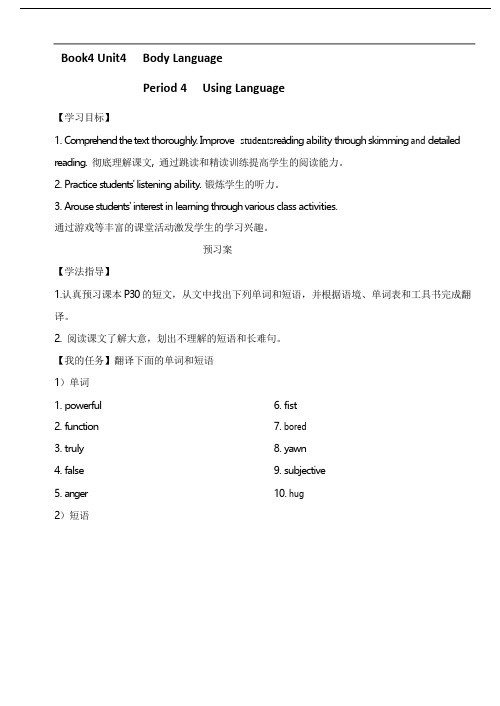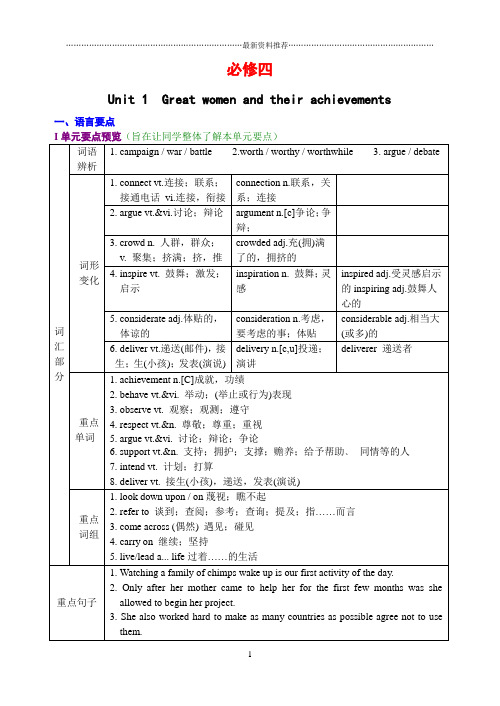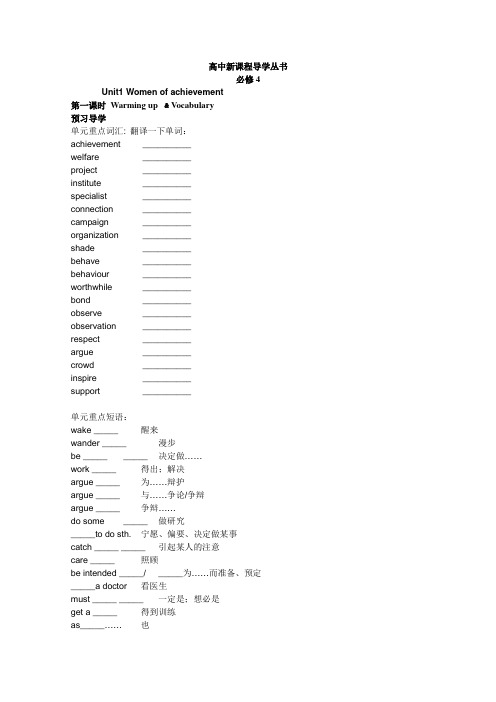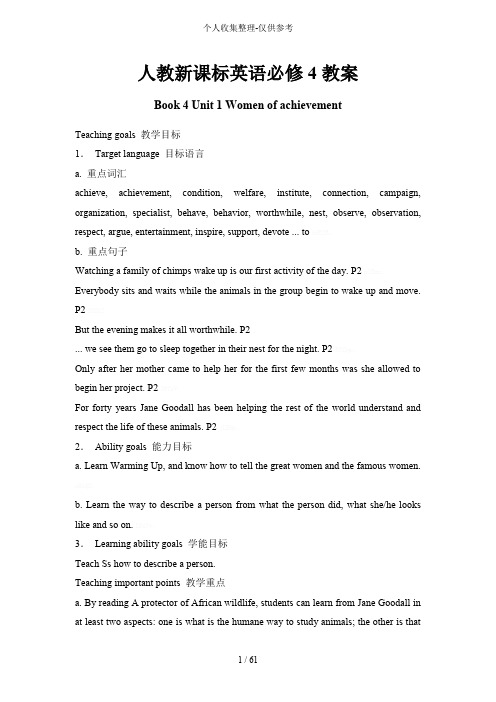人教版 高一英语必修四全册导学案
人教版 高一英语必修四全册导学案

必修四Unit 1 Great women and their achievements 一、语言要点1. behave vt.&vi. 举动;(举止或行为)表现behavio(u)r n. 行为;举止;习惯[典例]1). Behave yourself; don’ t make a fool of yourself. 注意你的举止, 别闹出笑话来。
2). How is your new car behaving? 你的新车性能如何?[重点用法]behave oneself 使某人自己举止规矩behaviour towards/to... 对……的态度/行为[练习] 根据句子的要求在括号里填入适当的词或翻译。
1). It’ s hard to train children to _______ _______ (举止得体) at the table.2). She is always _______ _______ (举止得体) at school.3). Their _______ (behave) _______ (介词) me shows that they do not like me.Keys: 1). behave well 2). well behaved 3). behaviour towards2. achievement n.[c]成就,功绩achieve vt. 取得,完成[典例]1). He received the Nobel Prize for his scientific achievements. 他因科学上取得的成就而获得诺贝尔奖。
2). Flying across the Atlantic for the first time was a great achievement. 首次飞越大西洋是一个伟大的功绩。
[重点用法]achieve an aim / goal达到目标achieve success 获得成功[练习] 根据句子的意思在括号里填入适当的词。
人教版高一英语Book 4 unit4 using language 导学案

’Book4 Unit4Body LanguagePeriod 4Using Language【学习目标】1. Compr ehend the text thoroughly . Improve students reading ability thr ough skimming and detailedreading. 彻底理解课文, 通过跳读和精读训练提高学生的阅读能力。
2. Practice students' listening ability. 锻炼学生的听力。
3. Arouse students' interest in learning thr oug h various class activities.通过游戏等丰富的课堂活动激发学生的学习兴趣。
预习案【学法指导】1.认真预习课本 P30 的短文,从文中找出下列单词和短语,并根据语境、单词表和工具书完成翻译。
2. 阅读课文了解大意,划出不理解的短语和长难句。
【我的任务】翻译下面的单词和短语1)单词1. powerful2. function3. truly4. false6. fist7. bored8. yawn9. subjective5. anger10. hug2)短语1.means of communication2.even if3.facial expression4..at ease5.丢脸6.背对7.在大部分情况下8.总体上,一般而言Ⅰ.重点单词重点单词•1.____________n.作用;功能;职能vi.起作用;运转→____________adj.功能的•2.____________n.安逸;舒适vt.减轻(痛苦、忧虑)→____________adj.•3.____________n.怒气;怒火→____________adj.生气的•4.____________adj.主观的→____________adv.主观地→____________adj.客观的客观的•5.____________vi.&vt.拥抱•6.____________n..等级;军衔•7.____________vi.皱眉•8._____________vt.读错;误解→______读懂;了解•9._____________adj.错误的;假的•10.____________n.拳头•11.____________vi.打哈欠•12._____________adj.恭敬的→____________v.尊敬→____________adv.尊敬地•13.______adv.真实地→______adj.真实的→_______n.真实;真实;•Ⅱ.重点短语重点短语•1.________________口头语言•2.________________全世界•3.________________面部表情•3.________________舒适,快活,自由自在•4.________________丢脸•5.________________背对-------;背弃•6.________________误会,误解•7.________________不看;把目光移开探究案【学法指导】仔细阅读P30文章,小组合作探究完成相关题目。
【人教版精品】高一英语必修四导学案全集精编版

必修四Unit 1 Great women and their achievements 一、语言要点IV 重点词汇(旨在提供综合运用所需材料)1. behave vt.&vi. 举动;(举止或行为)表现behavio(u)r n. 行为;举止;习惯[典例]1). Behave yourself; don’ t make a fool of yourself. 注意你的举止, 别闹出笑话来。
2). How is your new car behaving? 你的新车性能如何?[重点用法]behave oneself 使某人自己举止规矩behaviour towards/to... 对……的态度/行为[练习] 根据句子的要求在括号里填入适当的词或翻译。
1). It’ s hard to train children to _______ _______ (举止得体) at the table.2). She is always _______ _______ (举止得体) at school.3). Their _______ (behave) _______ (介词) me shows that they do not like me.Keys: 1). behave well 2). well behaved 3). behaviour towards2. achievement n.[c]成就,功绩achieve vt. 取得,完成[典例]1). He received the Nobel Prize for his scientific achievements. 他因科学上取得的成就而获得诺贝尔奖。
2). Flying across the Atlantic for the first time was a great achievement. 首次飞越大西洋是一个伟大的功绩。
[重点用法]achieve an aim / goal达到目标achieve success 获得成功[练习] 根据句子的意思在括号里填入适当的词。
#高中英语人教版必修4精品导学案(120页)

高中新课程导学丛书必修4Unit1 Women of achievement第一课时Warming up ﹠Vocabulary预习导学单元重点词汇: 翻译一下单词:achievement __________welfare __________project __________institute __________specialist __________connection __________campaign __________organization __________shade __________behave __________behaviour __________worthwhile __________bond __________observe __________observation __________respect __________argue __________crowd __________inspire __________support __________单元重点短语:wake _____ 醒来wander _____ 漫步be _____ _____ 决定做……work _____ 得出;解决argue _____ 为……辩护argue _____ 与……争论/争辩argue _____ 争辩……do some _____ 做研究_____to do sth. 宁愿、偏要、决定做某事catch _____ _____ 引起某人的注意care _____ 照顾be intended _____/ _____为……而准备、预定_____a doctor 看医生must _____ _____ 一定是;想必是get a _____ 得到训练as_____……也second _____ 次于get sb. _____ 使某人进入/陷入story _____ 一个故事接着一个_____a baby 给……接生_____the time 这时候carry_____ 继续be _____about 对……关心put…_____ _____ 处死devote……_____ 把……专注于……rather _____ 不是……而是……mean _____ 意味着mean _____ 打算做……settle _____ 安顿下来apply _____ 使用到……be _____to 已经做好准备去做……prepare_____ 准备要做……实战演练一、用worth/worthy/worthwhile 填空1. It’s well ____ making the effort to learn how to drive.2. We had a long wait, but it was _____ because we got the train tickets.3. Their success is _________ of the highest praise.4. It is not _____ my time.5. It is ________ to read the book.6. The book is _________ reading.7.This book is _________ to be read.二、完成句子:1. She ___________________(昨天表现出了巨大的勇气)。
人教版高一英语必修4unit3导学案

神木中学352高效课堂高一年级英语导学案Unit 3 A taste of English humour Period 7 writing主备人:赵瑞芹审定:高一英语备课组班级:__________ 小组____________姓名:____________Aim : To improve your wrting abilityFun storiesA Letter to GirlfriendOne day a young man was writing a letter to his girl friend that lived just a few miles away in a nearby town. Among other things, he was telling her how much he loved her and how wonderful he thought she was. The more he wrote the more poetic he became. Finally, he said that in order to be with her he would suffer the greatest difficulties, he would face the greatest dangers that anyone could imagine. In fact, to spend only one minute with her, he would climb the highest mountain in the world, he would swim across the widest river, he would enter the deepest forest and with his bare hands fight against the fiercest animals.He finished the letter, signed his name, and then suddenly remembered that he had forgotten to mention something quite important. So, in a postscript below his name, he added: “By the way I’ll be over to see you on Wednesday night—if it doesn’t rain.”。
高中英语必修4全套单元导学案

人教版高中英语必修4 全册导学案目录1.Unit 1 Women of achievement2.Unit 2 Working the land3.Unit 3 A taste of English humour4.Unit 4 Body language5.Unit 5 Theme parksUnitUnit 1 Women of achievement 成就卓越的女性核心词汇1.Where is it that you want to____________(庆祝)Christmas this year?2.Is this the sister you____________ (提及)to in your last letter?3.The CCTV concert was i____________ to call on more people to help the refugees of Yushu in Qinghai.4. Greatly____________ (激发;鼓舞)by the teacher’s words,I have made up my mind not to give up my goal.5.Trees can provide____________ (树荫)from the sun,so they can reduce cooling costs in summer.6.Small shops were ____________ (挤满)out by supermarkets during the economic crisis.7.The railway being built aims to ____________(连接)the small town to the big city. 8.Out of ____________(尊重),he accepted the idea that the old professor put forward at the meeting completely.9.Much to my surprise,he ____________ as if nothing had happened.In general,I was quite pleased with his ____________.(behave)10.I hold the firm belief that you are bound to ____________ your dream of being admitted to a key university,which will give you a wonderful sense of ____________.(achieve)1.observe2.referred3.intended4.inspired5.shade6.crowded7.connect8.respect9.behaved;behaviour,10.achieve;achievement高频短语1.______________ 献身于……;专心于……2.______________ 离开;起程;出发3.______________ 过着……的生活4.______________ (想法、问题等)涌上心头;涌入脑海5.______________ 蔑视;瞧不起6.______________ 查阅;参考;谈到7.______________ 碰巧;凑巧8.______________ (偶然)遇见;碰见9.______________ 专为……而设计,专供……而用10.______________ 继续;坚持1.devote to2.move off3.lead a...life4.crowd in5.look down upon/on6.refer to7.by chancee across9.be intended for 10.carry on重点句式1.__________________ her mother came to help her for the first few months __________________ to begin her project.她母亲头几个月来帮她的忙,这才使她得以开始自己的计划。
人教新课标英语必修4全册优秀导学案(60页)

人教新课标英语必修4教案Book 4 Unit 1 Women of achievementTeaching goals 教学目标1.Target language 目标语言a. 重点词汇achieve, achievement, condition, welfare, institute, connection, campaign, organization, specialist, behave, behavior, worthwhile, nest, observe, observation, respect, argue, entertainment, inspire, support, devote ... to b5E2R。
b. 重点句子Watching a family of chimps wake up is our first activity of the day. P2 p1Ean。
Everybody sits and waits while the animals in the group begin to wake up and move. P2 DXDiT。
But the evening makes it all worthwhile. P2... we see them go to sleep together in their nest for the night. P2 RTCrp。
Only after her mother came to help her for the first few months was she allowed to begin her project. P2 5PCzV。
For forty years Jane Goodall has been helping the rest of the world understand and respect the life of these animals. P2 jLBHr。
高一英语人教版必修四Unit1 Women of achievement 词汇导学案

achieve/realize one’s dream = one’s dream comes tr ue 实现梦想 achieve one’s goal 实现某人的目标 achieve success 获得成功a sense of achievement.一种成就感great scientific achievements 伟大的科学成就 Book4 Unit1 Women of achievement词汇导学案一、词汇变形 1. achievement(n.) --- achieve(v.)达到,完成2. specialist(n.)专家 -- special(adj.)---specially(adv.) --- specialize(v.)专攻 3. connection(n.)连接,关系 - connect(v.)---connected(adj.)连接的,有联系的anization(n.)组织,机构---organize(v.)组织,安排---organized(adj.)有组织的,有条理的----organizer(n.)组织者5. behave(v.)举动,表现--behavior(n.)6. observe(v.)观察,遵守,庆祝---observer(n.)观察员---observation(n.)观察---observatory(n.)天文台,气象台7.respect(v./n) 尊敬----respectable(adj.)值得尊敬的---respectful(adj.)恭敬的---respective(adj.)各自的8. argue(v.) --- argument(n.)争论,辩论9. entertainment(n.)娱乐二、重点单词1. achievement n .成就,成绩,达到,完成achieve v. 获得;实现① vt (凭借努力) 达到 (目标、地位、标准)----entertain(v.)招待,使快乐 ----entertaining(adj.)使人愉快的 --entertainer(n.)表演者,艺人10.inspire(v.)鼓舞,激发 ---inspired(adj.)感到鼓舞的 ---inspiring(adj.)鼓舞人心的 ----inspiration(n.)灵感 11. support(n./v)----supporter(n.)支持者 12. refer(v)谈到,查阅,参考 ---reference (n.) 提及,参考 13. sickness(n.)疾病 - sick(adj.) 14. determination(n.)决心--determine (v.) --determined(adj.) 有决心的,意志坚定的 15. intend(v.)打算 intention (n.)意图,目的16.consider(v.) --- consideration(n.)考虑 ----considerate(adj.)考虑周到的 ---considerable(adj.)相当多(大,重要)的17.deliver(v.)递送,接生,发表演讲 ---delivery (n.)递送,接生 18. generation(n.)一代--generate(v.)产生,引起 1) He had finally ___ .(取得成功) 2) *I used to try effective methods t o __ . (为实现自己的学习目标) ② vt 完成3) *He had achieved ____ he thought impossible. 他做成了自己以为不可能的事。
高中英语人教版必修4精品导教案(120页)

高中新课程导学丛书必修4Unit1 Women of achievement第一课时 Warming up ﹠Vocabulary预习导学单元重点词汇: 翻译一下单词:achievement __________welfare __________project __________institute __________specialist __________connection __________campaign __________organization __________shade __________behave __________behaviour __________worthwhile __________bond __________observe __________observation __________respect __________argue __________crowd __________inspire __________support __________单元重点短语:wake _____ 醒来wander _____ 漫步be _____ _____ 决定做……work _____ 得出;解决argue _____ 为……辩护argue _____ 与……争论/争辩argue _____ 争辩……do some _____ 做研究_____to do sth. 宁愿、偏要、决定做某事catch _____ _____ 引起某人的注意care _____ 照顾be intended _____/ _____为……而准备、预定_____a doctor 看医生must _____ _____ 一定是;想必是get a _____ 得到训练as_____……也second _____ 次于get sb. _____ 使某人进入/陷入story _____ 一个故事接着一个_____a baby 给……接生_____the time 这时候carry_____ 继续be _____about 对……关心put…_____ _____处死devote……_____把……专注于……rather _____ 不是……而是……mean _____ 意味着mean _____ 打算做……settle _____ 安顿下来apply _____ 应用到……be _____to 已经做好准备去做……prepare_____ 准备要做……实战演练一、用worth/worthy/worthwhile 填空1. It’s well ____ making the effort to learn how to drive.QGrmyFILnK2. We had a long wait, but it was _____ because we got the traintickets.QGrmyFILnK3. Their success is _________ of the highest praise.QGrmyFILnK4. It is not _____ my time.5. It is ________ to read the book.6. The book is _________ reading.7.This book is _________ to be read.二、完成句子:1. She ___________________(昨天表现出了巨大的勇气>。
高一英语人教版必修四导学案 Unit 4 Body language

高中英语必修四导学案UNIT4 Body languageWarming up and reading Learning aims1.Learn the new words2.Understand the meaning of BL一. Learning difficulty point and important point1.Grasp important words2.Improve the reading skills三.Learning ProceduresStep1.Warming up1.Look at the pictures below.What are these people communicating?2.What are the following facial expressions?3.What do people in different countries usually do when meeting?Step2.Pre-reading1. What is the purpose of language?2. How can you tell someo ne’s feelings even if they do not speak?3.What would you do if you need the other’s help urgently while you two speak different languages?4.What do you think “body language” means?5.What is body language?Step3.Reading1.Learn new words :local . represent. approach .major. express. curious .general .avoid .misunderstanding .close . see sb do. likely to do . in defence .2.SkimmingDivide the passage into four parts and find out the main idea of each part. Part 1 : (Para1):Part 2: (Para 2 and 3) :Part 3: (Para 4 and 5):.Part4:(Para6)How do different international students behave when they greet people? Complete the chart with information from the passage.【归纳小结】 Body language is different/ varies from culture to culture. Not all members of all cultures behave in the same way. We should try to understand and respect ea ch other’s culture in order to make good communication.Reading – III ( 3m )【当堂训练】 Decide if the following statements are true (T) or false (F).1. Englishmen often stand close to others or touch strangers as soon as they meet.2. Most people around the world now greet each other by kissing.3. Japanese will bow to others as greeting.4. People from Jordan will move very close to you as you introduce yourself to them.5. Some body languages in some countries are good while some countries’ body language are bad.6. People from different countries may have a major misunderstanding while greeting each other.7. The physical distance from each other that people are comfortable with generally depends on the culture.8. All members of a culture behave in the same way.Choose the best answer.1. What did the writer go to the Capital International Airport for yesterday?A. To see off his friend.B. To meet international students.C. To buy a flight ticket.D. To meet some visitors coming from several countries.2. Where is Tony Garcia from?A. Britain.B. Japan.C. Colombia.D. Canada.3. From Paragraph 2 we know that Japanese prefer to ____ when they are introduced to others.A. bowB. shake handsC. kiss each otherD. touch others’ shoulders4. According to the text, men from the Middle East often ____.A. nod heads and wave hands to girlsB. touch others’ heads when they first meetC. kiss each other twice on each cheek when they are introduced to othersD. stand quite close to other men when they talkAnswer the questions.1. Why are the international students coming to China?2. Why is Julia Smith surprised?3. Why did the author move back from Ahmed Aziz?4. What do French people often do when they meet people they know?6. Is the author of this passage male or female? How do you know?Step4.Homework:. Recite the new words in the text.2. Go over “Learning about language” 1. 2. And 3 on P27-28.课堂小结:。
高中英语人教版必修4精品导学案(120页)

高中新课程导学丛书必修4Unit1 Women of achievement第一课时Warming up ﹠Vocabulary预习导学单元重点词汇: 翻译一下单词:achievement __________welfare __________project __________institute __________specialist __________connection __________campaign __________organization __________shade __________behave __________behaviour __________worthwhile __________bond __________observe __________observation __________respect __________argue __________crowd __________inspire __________support __________单元重点短语:wake _____ 醒来wander _____ 漫步be _____ _____ 决定做……work _____ 得出;解决argue _____ 为……辩护argue _____ 与……争论/争辩argue _____ 争辩……do some _____ 做研究_____to do sth. 宁愿、偏要、决定做某事catch _____ _____ 引起某人的注意care _____ 照顾be intended _____/ _____为……而准备、预定_____a doctor 看医生must _____ _____ 一定是;想必是get a _____ 得到训练as_____……也second _____ 次于get sb. _____ 使某人进入/陷入story _____ 一个故事接着一个_____a baby 给……接生_____the time 这时候carry_____ 继续be _____about 对……关心put…_____ _____ 处死devote……_____ 把……专注于……rather _____ 不是……而是……mean _____ 意味着mean _____ 打算做……settle _____ 安顿下来apply _____ 应用到……be _____to 已经做好准备去做……prepare_____ 准备要做……实战演练一、用worth/worthy/worthwhile 填空1. It’s well ____ making the effort to learn how to drive.2. We had a long wait, but it was _____ because we got the train tickets.3. Their success is _________ of the highest praise.4. It is not _____ my time.5. It is ________ to read the book.6. The book is _________ reading.7.This book is _________ to be read.二、完成句子:1. She ___________________(昨天表现出了巨大的勇气)。
人教版高中必修四英语unit1-reading导学案

人教版高中必修四英语Unit 1 Women of achievementReading A STUDENT OF AFRICAN WILDLIFETask 1: Skimming for general information1. Who is the “student”?2. What animals are observed?Task 2: Scanning for outlinesPara 1: Jane’s discovery of chimpsPara 2: a day in the parkPara 3: Jane’s achievementsPara 4: Jane’s attitudes and effortsTask 3: Reading for detailsChoose the best answers according to the passage.1.Jane Goodall has studied chimps for many years in order to _____.A. become an expert in this fieldB. gain her doctor’s degreeC. discover what chimps eatD. help people understand the behavior of chimps2. According to the text, chimps usually spend most of their time _______ as a way of showing love for their family.A. looking after their babiesB. wandering about the forest togetherC. feeding or cleaning each otherD. chasing and fighting each other3. We know from Paragraph 2 that Jane Goodall discovered an important fact that _______.A. chimps hunt and eat meatB. chimps eat only fruit and nutsC. chimps can use a toolD. chimps sleep together in their nest4. Jane Goodall suggested that wild animals should be________.A. given more food to eatB. allowed to live in the wildC. used for science experimentsD. used for entertainment5. From the passage we know the bond between members of a chimp family____.A. is very strongB. is a little weakC. doesn’t existD. is the strongest of all the animalsTask 4: SummaryRead the passage carefully and fill in the blanks.Jane Goodall had wanted to work with animals in their own environment 1__________ she was a child. But this was not easy. When she first arrived in Combe in 1960, it was 2__________(usual) for a woman to live in the forest. However, 3__________ the help of her mother, she began her work with the chimps, 4__________ changed the way that people think about chimps. Jane spent many years 5____________(observe) and recording their daily 6____________(active). She discovered that chimps hunt and eat meat, against 7__________ people used to think.Working with the chimps for years, Jane has argued that wild animals should 8____________(leave) in the wild and not used for 9______________(entertain) or advertisement. She has achieved everything she wanted to do, but more 10______________(importance), she has got the world to understand and respect the lives of chimps.Task 5: Discussion1. What did Jane have to give up when she went to live in the forest?2. Do you think it is important to study chimps in the wild rather than in a zoo?Give reasons.Homework :1. Finish exercise 1&2 on page 3.2. Mark difficult and important sentences of the text.1。
人教版必修高一英语下学期Book4Unit4语法导学案全面版

人教版必修高一英语放学期Book4 Unit4语法导教案课标解读:本单元的语法项目是动词的-ing 形式做状语和定语。
教师应该启迪学生思虑,经过示例指引学生总结出动词的-ing 形式在什么状况下作状语或作定语,而后进一步理解其用法,直至比较娴熟的掌握与运用。
Teaching aims(教课目标)Knowledge aims:Get students to know the use of the –ing formas the attribute and the adverbial.Ability aims:Enable students to learn the use of the –ing formas the attribute and the adverbial accordingto the context.Emotional aim:1.Get students to become interested in grammar learning.2.Develop students ’ sense of group cooperation.Teaching emphasis(教课要点)Get students to learn and master the use of the –ing form as the attribute and the adverbial. Teachingdifficulties (教课难点)Enable students to learn how to use the rules ofthe –ing formas the attribute and the adverbial correctly.Teaching &learning procedures (教课与学习过程)【巧设导语激发兴趣】(5 分钟)Step1. Preparing lessons &self-study and exploring the problemsAsk the Ss to report the answers and read the passage quickly to point out the sentences including the –ing form in the text.【整体感知情形创建】Step2.Finishing plan & asking questionsReport the answers to the class and teacher.Point out the sentences including the–ing form in the text.Step3.Researching cooperatively& answering questionsAnd ask the Ss what the rules of the –ing form in the text are.Task1. turn back to Page 26 to read through the passage Communication:No Problem? pick out the sentences using the-ing forms as the attribute and theadverbial., and then underline the–ing form in each sentence and translate the whole sentence into Chinese.1)Yesterday, another student and I , representing our university’s studentassociation, went to the CapitalInternationalAirport to meet this year’s international students. (attribute)2)After half an hour of waiting for their flight to arrive, I saw several youngpeople enter the waiting area looking around curiously. (attribute)(adverbial)3)I stood for a minute watching them and then went to greet them.(adverbial)4)She stepped back appearing surprised and put up her hands, as if in defence.(adverbial)5)Then Akira Nagata from Japan came in smiling, together with George Cook fromCanada.(adverbial)6)Just at that moment,hwever, Akira bowed so his nose touched George ’s moving hand. (attribute)7)When Darlene Coulon from France came dashing through the door, she recognized Tony Garacia’s smiling face. (adverbial)8)In the same way that people communicate with spoken language , they also express their feelings using unspoken ”language”through physical distance, actions or posture.(adverbial)【提出问题合作研究】( 15 分钟)Step4.Summing &chewing, summarizing knowledgeTask 2.Grammar learning一、作定语。
- 1、下载文档前请自行甄别文档内容的完整性,平台不提供额外的编辑、内容补充、找答案等附加服务。
- 2、"仅部分预览"的文档,不可在线预览部分如存在完整性等问题,可反馈申请退款(可完整预览的文档不适用该条件!)。
- 3、如文档侵犯您的权益,请联系客服反馈,我们会尽快为您处理(人工客服工作时间:9:00-18:30)。
必修四Unit 1 Great women and their achievements 一、语言要点1. behave vt.&vi. 举动;(举止或行为)表现behavio(u)r n. 行为;举止;习惯[典例]1). Behave yourself; don’ t make a fool of yourself. 注意你的举止, 别闹出笑话来。
2). How is your new car behaving? 你的新车性能如何?[重点用法]behave oneself 使某人自己举止规矩behaviour towards/to... 对……的态度/行为[练习] 根据句子的要求在括号里填入适当的词或翻译。
1). It’ s hard to train children to _______ _______ (举止得体) at the table.2). She is always _______ _______ (举止得体) at school.3). Their _______ (behave) _______ (介词) me shows that they do not like me.Keys: 1). behave well 2). well behaved 3). behaviour towards2. achievement n.[c]成就,功绩achieve vt. 取得,完成[典例]1). He received the Nobel Prize for his scientific achievements. 他因科学上取得的成就而获得诺贝尔奖。
2). Flying across the Atlantic for the first time was a great achievement. 首次飞越大西洋是一个伟大的功绩。
[重点用法]achieve an aim / goal达到目标achieve success 获得成功[练习] 根据句子的意思在括号里填入适当的词。
1). Without the support of the people we can _______ _______.2). I have achieved only half of _______ I hope to do.3). Congratulations to you (介词) _______ such a complete victory.Keys: 1). achieve nothing 2). what 3). on; achieving3. observe vt. 观察;观测;遵守observation n.[u] 观察;观测;监视[典例]1). The police observed the man entering/enter the bank. 警方监视着那男子进入银行的情况。
2). The woman was observed to follow him closely. 有人看到那女子紧跟着他。
[重点用法]observe sb. do sth. 观察某人做某事(已做完) observe sb. doing sth. 观察某人正在做某事under observation 被监视[练习] 用括号内所提供词的适当形式填空或翻译。
1). They were observed ______ (enter) the bank then.2). Keynes _______ _______ (观察到) humans fall into two classes.Keys: 1). entering 2). observed that4. respect vt.&n. 尊敬;尊重;重视[典例]1). If you don’ t respect yourself, how can you expect others to respect you? 自己不自重, 又怎能受到别人尊重呢?2). I have the greatest respect for you. 我非常尊敬您。
[重点用法]respect sb. for sth. 因某事而尊敬某人have / show respect for sb./sth. 尊敬某人/事gain/get/earn/win the respect of sb. 赢得某人的尊敬out of respect 出于尊敬[练习] 根据句子的要求在括号里填入适当的词或翻译。
1). The new officer soon ________ (赢得) the respect of his men.2). I ________ you ________ (因某事而尊敬) your honesty.3). I have great respect _______ (介词) his ideas, although I don’ t agree with them.Keys: 1). won/earned 2). respect; for 3). for5. argue vt.&vi. 讨论;辩论;争论argument n.[c]争论;争辩;争吵[典例]1). Don’ t argue with your mother. 不要和母亲争辩。
2). I argued that we needed a larger office. 我据理力争我们需要大些的办公室。
[重点用法]argue for (sb./sth.)为(某人/某事)而辩护argue against (sb./sth.) 反对某人/某事)而辩护argue with sb. ( about/over sth.) 与某人(为某事)而争吵argue that... 主张……argue sb. into/out of doing sth. 通过争论使某人做/不做某事have an argument about/over sth. 辩论某事[练习] 根据句子的要求在括号里填入适当的介词或翻译。
1). We ______ ______ ______ ______ (说服她加入) us.2). We argued _______ the waiter _______ the price ______ the meal.Keys: 1). argued her into joining 2). with; about; of6. support vt.&n. 支持;拥护;支撑;赡养;给予帮助﹑同情等的人[典例]1). Is this bridge strong enough to support heavy lorries? 这座桥禁得住重型卡车通行吗?2). He was weak with hunger, so I had to support him. 他饿得没有力气, 我得搀着他。
[重点用法]support sb./ a family 支持某人/ 赡养家庭support sb. in (doing) sth. 在(做)某事方面支持某人support sb. by (doing) sth. 通过做某事支持某人in support of sb/sth 支持或支援某人/事物support oneself 自力更生give support to sb. 支持、支援某人[练习] 根据句子的要求在括号里填入适当的词或翻译。
1). Will you support me _______ (介词) my campaign for election?2). Jim was a great support _______ (介词) them when their father died.3). 我求学期间由父母供养。
___________________________________________________________________________ Keys: 1). in 2). to 3). I was supported by my parents when I was studying.7. intend vt. 计划;打算intention n. 意图,意向,目的[典例]1). I hear they intend to marry/intend marrying. 听说他们要结婚了。
2). I intend you to take over. 我打算让你来接管。
[重点用法]intend to do/doing sth. = mean to do sth. 打算做某sth. be intended for (某物)是为而准备的intend sb. to do sth. 打算让某人做某事intend sth. as/to be 打算让某物作……用intend that... 打算……[练习] 根据句子的要求在括号里填入适当的词或翻译。
1). This book is ______ ______ ______ (是为初学者写的).2). Was that remark intended _______ (介词) a joke?3). I didn’ t intend her ______ (see) the painting until it was finished.Keys: 1). intended for 2). as 3). to see8. deliver vt.接生(小孩),递送,发表(演说) delivery n. 投递deliverer 递送者,交货人[典例]1). The baby was delivered in a clinic. 孩子是在一个医疗站接生的。
2). Comrade Yang delivered the opening speech. 杨同志致开幕词。
[重点用法]deliver a baby 接生小孩;生小孩delivere sth. to ...... 把某物送到……express delivery快递on delivery 送达时,货到时[练习] 根据句子的要求在括号里填入适当的词。
1). Some new books have ______ (deliver) ______ (介词) the schoo1.2). The actor _______ his speech _______ (介词) a soft voice.Keys: 1). been delivered; to 2). delivered/gave; inV 重点词组(旨在提供综合运用所需材料)1. look down upon/on蔑视;瞧不起[典例]1). She looks down on people who've never been to university. 她瞧不起没上过大学的人。
